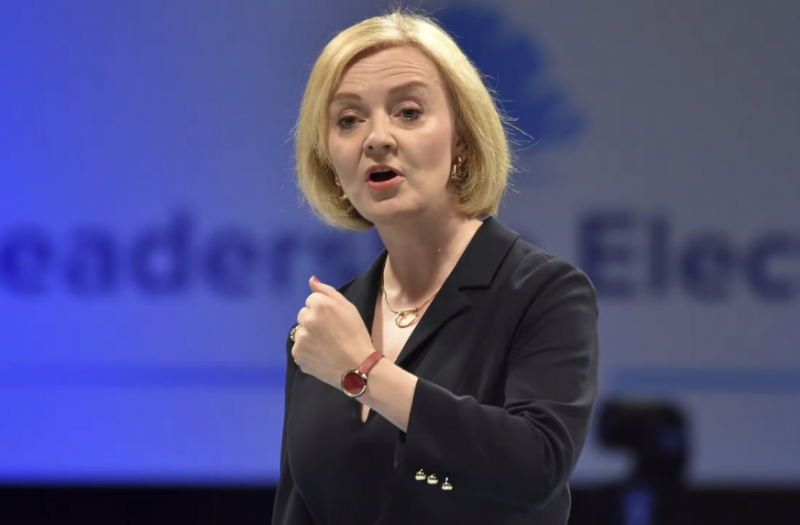
UK: The race to become Britain's next prime minister is in its final week, with Liz Truss on track to rise to the top, despite tough challenges.
Foreign Secretary Truss, 47, has consistently beaten former finance minister Rishi Sunak, 42, in the election of Conservative Party members, which will decide the contest that began in early July.
An estimated 200,000 Tories have been able to vote for their favorite candidate since the beginning of this month, with postal and online ballots closing in on Friday.
The winner will be announced the following Monday and will take office the next day in Downing Street, replacing outgoing Prime Minister Boris Johnson, only to face an immediate crisis due to rising cost of living.
After Johnson announced his resignation in early July, he was given the incredible task of leading Britain through its highest inflation in 40 years and warnings of an impending recession.
It came after months of scandals that forced Sunak and dozens of other ministers to resign from the government, leading to his departure.
Some ministers and lawmakers, including Truss, remained loyal to Johnson until the end, arguing that he deserved more time to replace his scandal-ridden three-year term.
About 10,000 Tory members are reportedly so outraged by his forced resignation that they want the ruling party to allow them to vote on whether to accept it or not.
The Tory hierarchy is opposed to the move, while Downing Street has distanced itself from the campaign, claiming that Johnson would support the winner of the leadership election.
With more schism than the bitter feud between Truss and Sunak, whoever could struggle to get the Conservatives back together.
Initially, eight Conservative MPs were eligible to participate in the race, but party MPs reduced that number to five ballots.
Sunak was at the forefront of all Conservative MP votes, while Truss finished third in a row.
She missed the final pairing on 20 July by eight votes.
However, once the run-off began, she quickly rose to the top of the polls, gaining the support of key members of Johnson's late cabinet, as well as several lawmakers from her rival's camp.
Sunak, who faced criticism from some Tory members for his role in ousting Johnson, has been demoted as a longtime contender.
The two candidates contested the election a dozen times in front of members as well as several televised debates over their policies and records, the most recent of which will be held on Wednesday evening in London.
However, with the election leading by more than 30 points, the race seems to have effectively ended.
However, recent polls to the general electorate show the difficulty ahead.
In the deteriorating economic climate, the main opposition Labor Party now has a double-digit lead over the Conservatives.
The next general election is scheduled for January 2025, but it could happen sooner than most people expect in 2024.
The leadership race has been dominated by how Britain's growing economic crisis should be addressed, engaging in open political warfare with rival candidates and their camps.
The truss has promised immediate tax cuts and a renewed emphasis on economic growth, criticizing its rival for raising taxes to record levels and presiding over dwindling growth.
Sunak has stressed the importance of maintaining current taxes, including recent increases, in the short term, while promising more targeted aid for the most vulnerable during the crisis of cost of living.
He has claimed that his record as finance minister during the pandemic shows that he can help Britons overcome their economic difficulties.
His holiday program, which temporarily paid the wages of millions, is credited with preventing mass unemployment.
Sunak, who was first elected to parliament in 2015 and voted for Brexit in the 2016 referendum, has accused Truss of "fairy tale economics" and claimed that his tax cuts would worsen inflation. Will go
Analysts say the campaign has demonstrated that Truss, who was first elected as an MP in 2010, has superior political experience and skills.
"She was able to communicate effectively," said polling expert John Curtis, noting that the craze appeared "a bit brittle."
Tim Bell, professor of politics at Queen Mary University of London, observed that the truss had in some ways broken his own record.
Despite being a minister in successive Tory governments for the past decade and voting to remain in the European Union in 2016, she ran on a populist anti-incumbency platform in the election.
"She somehow managed to present herself as more Brexitier than Rishi Sunak, who actually voted to leave (the EU)," Bell said.
British households told to 'look at' energy use as prices soar
UK Prime Ministerial Election: Liz Truss continues to lead Rishi Sunak
UK's Truss has pledged to redirect $15 billion from the NHS to social care